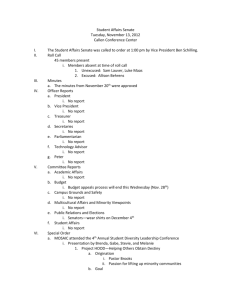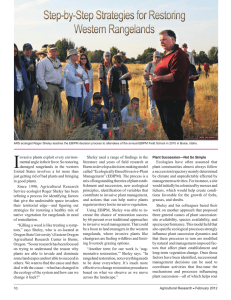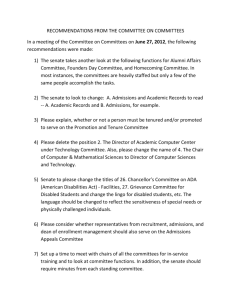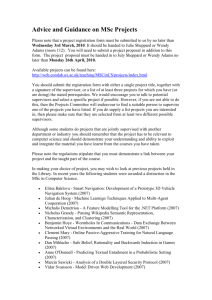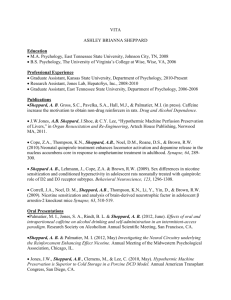csu, sacramento - California State University, Sacramento
advertisement
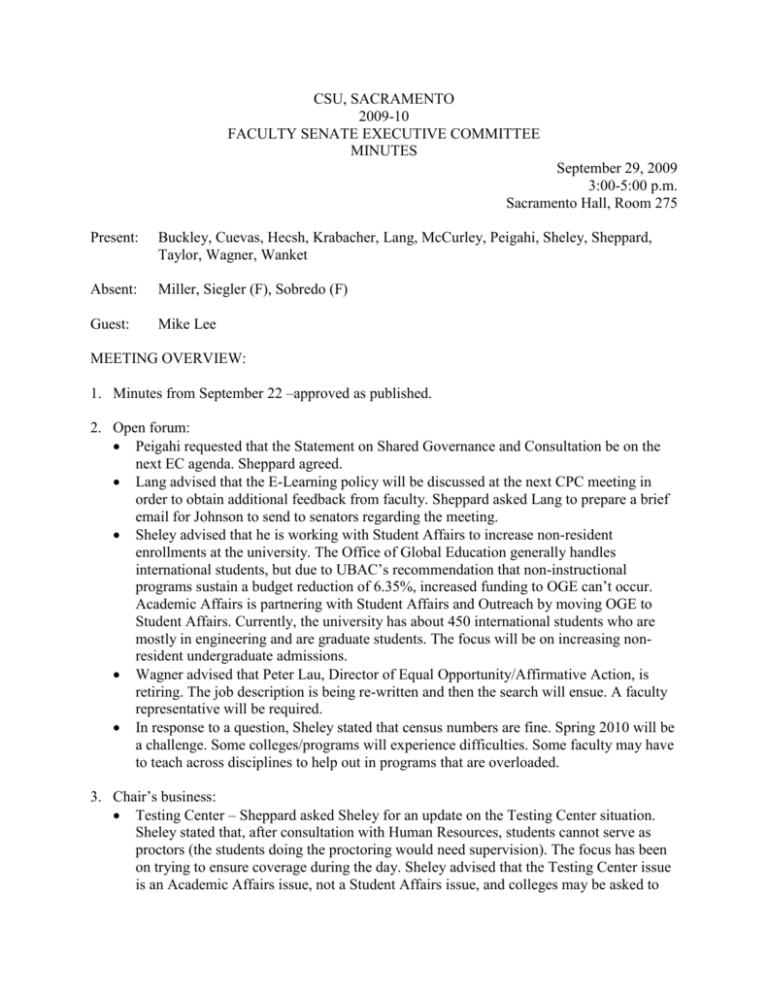
CSU, SACRAMENTO 2009-10 FACULTY SENATE EXECUTIVE COMMITTEE MINUTES September 29, 2009 3:00-5:00 p.m. Sacramento Hall, Room 275 Present: Buckley, Cuevas, Hecsh, Krabacher, Lang, McCurley, Peigahi, Sheley, Sheppard, Taylor, Wagner, Wanket Absent: Miller, Siegler (F), Sobredo (F) Guest: Mike Lee MEETING OVERVIEW: 1. Minutes from September 22 –approved as published. 2. Open forum: Peigahi requested that the Statement on Shared Governance and Consultation be on the next EC agenda. Sheppard agreed. Lang advised that the E-Learning policy will be discussed at the next CPC meeting in order to obtain additional feedback from faculty. Sheppard asked Lang to prepare a brief email for Johnson to send to senators regarding the meeting. Sheley advised that he is working with Student Affairs to increase non-resident enrollments at the university. The Office of Global Education generally handles international students, but due to UBAC’s recommendation that non-instructional programs sustain a budget reduction of 6.35%, increased funding to OGE can’t occur. Academic Affairs is partnering with Student Affairs and Outreach by moving OGE to Student Affairs. Currently, the university has about 450 international students who are mostly in engineering and are graduate students. The focus will be on increasing nonresident undergraduate admissions. Wagner advised that Peter Lau, Director of Equal Opportunity/Affirmative Action, is retiring. The job description is being re-written and then the search will ensue. A faculty representative will be required. In response to a question, Sheley stated that census numbers are fine. Spring 2010 will be a challenge. Some colleges/programs will experience difficulties. Some faculty may have to teach across disciplines to help out in programs that are overloaded. 3. Chair’s business: Testing Center – Sheppard asked Sheley for an update on the Testing Center situation. Sheley stated that, after consultation with Human Resources, students cannot serve as proctors (the students doing the proctoring would need supervision). The focus has been on trying to ensure coverage during the day. Sheley advised that the Testing Center issue is an Academic Affairs issue, not a Student Affairs issue, and colleges may be asked to help pay for coverage. Hecsh asked if providing for make-up testing arrangements is an individual faculty member’s responsibility. Buckley stated that perhaps individual departments/colleges should handle arrangements on an as needed basis. Lang agreed. Peigahi stated that the Library may be able to handle the space issue. Sheley stated that whatever proctoring arrangements are established, staff shouldn’t be put upon with this additional duty. Essential support services (e.g., Hornet shuttle services, medical services, public safety) on MPP/staff furlough days – Sheley stated that he is awaiting a response from Steve Garcia, Vice President of Administration and Business Affairs, on the Hornet Shuttle issue. 4. Budget – discussion included the following: The informal workgroup of EC members have met, with the goals of engaging faculty as much as possible and having something useful for the university to use to establish budget priorities for 2010/11. Spring 2010 is pretty much set and too soon for such a process to influence. There will be 3 meetings in October. At the 10/1 meeting, Sheppard will announce that discussions are ongoing and that the 10/15 meeting will be on the single subject of the budget, e.g., principles, parameters, priorities. The Senate will meet as a Committee of the Whole. At the 10/29 meeting, there will be an item up for first reading based on the discussions at the 10/15 meeting. Some priorities might be: graduate all students who are currently enrolled; don’t admit new students if you can’t graduate them; honor priorities set by individual programs (home rule) Faculty need to understand the external constraints the university must operate within (Title V). For example, the university can’t reduce the minimum number of units students need for a baccalaureate degree, but can streamline the pathway to graduation. The document and priorities shouldn’t be so broad as to be useless but not be so specific as to be timebound. Sheley stated that the priorities need to be useful when budget times improve. The priorities can exceed the framework in case the framework changes in the future. Lee offered the services of the Office of Institutional Research in providing data to guide the priorities vs. relying on anecdotes. Wagner stated that faculty, through their senators, should be invited to provide input as far as resources to look at and documents to read. 5. Retreat feedback – Hecsh and McCurley volunteered to synthesize the feedback in the 2 areas other than the budget. The Committee will revisit the matter on 10/6. With regard to Senate structure, Sheppard reminded the Committee that the Senate office budget will incur a deficit under its current structure (5 committee chairs receiving 6 units of release time each; Senate Chair receiving 9 units). Siegler and Lang are not receiving units for F’09. Sheppard is only taking 6 units. It is probable that the Senate office will not have carry forward funds next year. The Committee discussed how changes to the amount of release time committee chairs receive will affect who wants to be a chair. Sheppard stated that the structure needs to be figured out by the end of the F’09 semester, as elections occur in S’10 for 10/11. Krabacher stated that since the EC and Senate are attempting to craft budget priorities, the Senate office budget can be on the EC’s agenda for November. The Committee agreed. 6. By-laws – Krabacher advised that he, Juanita Barrena and William Dillon worked on some revisions to the By-laws. Krabacher stated that a document for the EC’s agenda could be ready in about 2 weeks. Sheppard requested that there be a companion document, outlining the substantive vs. clean-up language. 7. SPC reports – the Committee deferred the matter to allow time for members to read the pertinent documents.
